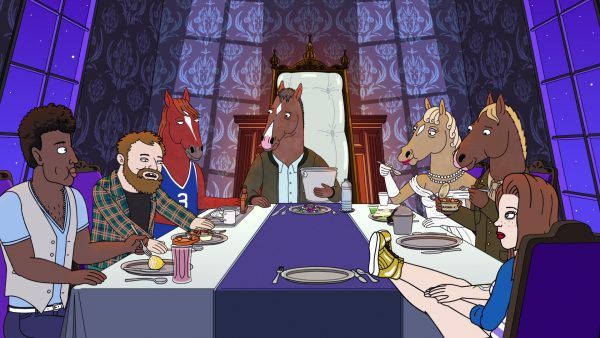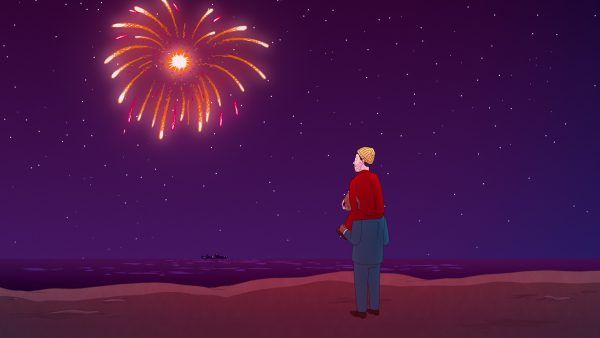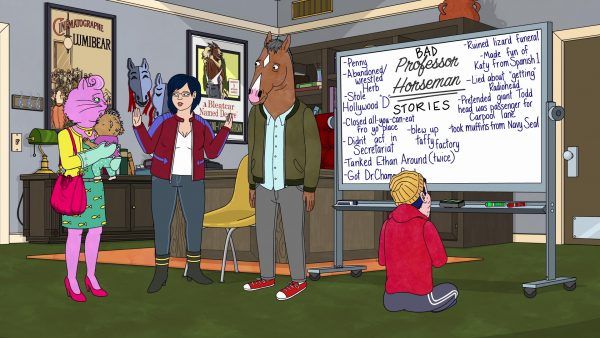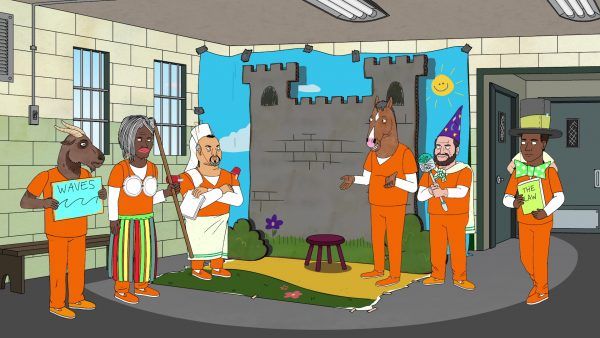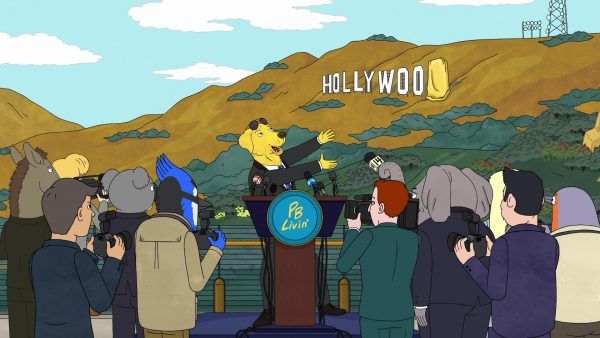If you've ever watched BoJack Horseman, you will not be shocked to learn that creator Raphael Bob-Waksberg is delighted to riff, even in an interview setting, on the latest developments in pop culture. Thus, at the beginning of our conversation about the final season of his critically acclaimed series, now contending for an Emmy for Best Animated Series, we started off talking about his thoughts on Christopher Nolan's Tenet — thoughts which I have condensed down to the following paragraph:
"I feel like if they keep pushing it back, they're going to have to call it Eleven-et. That's a terrible piece of business. That's proof that I don't pre-write my interviews — that I could pull a joke that bad out of my ass... He already made a backwards movie. Is this just Memento again? It's a stealth sequel to Memento. It's a stealth sequel, like he's M. Night Shyamalan-ing us. We're going to get to the end, and the whole movie is going to be about these two guys trying to find the Tenet button, and then it turns out the guy who pushes the Tenet button at the end, it was Johnny Memento! From Memento. Turns out Johnny Memento was the one giving these Tenet brothers a ride for their lives."
This was, oddly enough, how we ended up segueing into a discussion of "The View From Halfway Down," the Emmy-nominated episode of BoJack's final season. The penultimate installment takes place outside of the show's established reality as the titular horseman contends with a near-death experience that, as viewers, we have no idea he'll be able to survive — it's a surreal, hilarious, and haunting episode which, like the rest of the series, wears its heart and its influences on its sleeve. And so below, enjoy Bob-Waksberg digging into the legacy of his series and why he no longer feels ownership over the show, seguing directly from Christopher Nolan to All That Jazz director Bob Fosse, as Bob-Waksberg jokes that "As far as level of interest in the internal life of women, I think Bob Fosse and Christopher Nolan were pretty much on the same level." To which I responded...
Collider: To Bob Fosse's credit, he very rarely kills any wives.
RAPHAEL BOB-WAKSBERG: That's true. That's true. Bob Fosse is also definitely very interested in the outsides of women, so he's got that going for him.
I actually saw All That Jazz, which was obviously a heavy inspiration for "The View From Halfway Down," the penultimate episode of the series — I saw that for the first time shortly before we sold BoJack to Netflix. I remember I was developing BoJack with Tornante at the time. And I think the reference points for BoJack early on, I think, were maybe Curb Your Enthusiasm, Greenberg, The Great Gatsby a little bit, but these snarky, curmudgeonly guys. And I remember talking to Steve Cohen, who's the executive producer, right after I saw All That Jazz, and I was like, "I think this show might be more All That Jazz than these other things." He was like, "Um, what? That's not the show that we thought we were developing." But he was into it. He's like, "All right. Let's see it." So I'm glad that we finally got to fulfill the promise of that premise here in the last season and really wear that influence proudly.
Now, when you say you saw it right around then, was it something where someone said to you, "Oh, you know what you might want to check out while you're developing this idea?"
BOB-WAKSBERG: No, it was unrelated. Nobody would have made that connection. I just was with a friend that night, like, "What should we watch tonight?" "Oh, I heard this movie was good." I didn't know much about it. And it kind of blew my mind, although I feel like the musical sequences are maybe better than the non-musical sequence parts.
When it comes to "The View From Halfway Down," there's always that interesting question of, when it comes Emmys time, what episode do you submit? And you actually had 16 options this time. Was it always kind of a foregone conclusion that this would be the episode, or did you consider others from the last season?
BOB-WAKSBERG: I mean, when the episode dropped, it became clear that this is really the big episode that everyone is talking about. I think we have a very strong season at 16 episodes. I think we have a lot of fabulous episodes in the bunch, but it felt like this episode is really the culmination of a lot of what the show was both thematically and story-wise about, and it kind of felt like everything was building to this moment. It's the climax of the whole show, even though it's, in some ways, a very atypical episode. But I think by being an atypical episode, it actually makes it a typical episode. A lot of BoJack is made up of atypical episodes. That's one of our strong suits I think, is how we play those. I don't remember a lot of debate around it. It felt like it made sense as the episode to submit.
You can look at it and say well, "This doesn't feature any of our main characters except for BoJack and a little bit of Diane," and yeah, it's all in BoJack's head, but we have a lot of episodes like that that are these one-offs that feel like a piece of the rest of the show but also their own thing. So I think in some ways it actually makes a strong case for the show that we do stuff like this, and we do stuff like this with regularity. It's not like every episode follows the same format, and then all of a sudden six seasons in we did this wild episode like this. I say out of every season, almost half of them feel this ambitious or atypical in some way.
Absolutely. So when it comes to the ending, what was the process like, of figuring out what you wanted that last beat to be?
BOB-WAKSBERG: I want to be very careful when I talk about the ending, because I feel like what I like about it is that it's open to interpretation, and I worry that if I share too much about my interpretation, that will be read as the correct interpretation. You know what I mean? I think about like poor David Chase — every time he says something about the end of The Sopranos it reignites this conversation about like, "What is the correct read of the end of The Sopranos?" I don't know David Chase — oh, well, I guess I've met him. He cameoed on BoJack. I forgot about that. I did not discuss The Sopranos with him, which I think might be the first time in the last 10 years he had a conversation with somebody where they didn't bring up the end. I don't know what he thinks about it, but I think he made it pretty clear that he's not going to give us any more answers than what was in the show itself, and yet still whenever he says something, people interpreted that as like, "Oh, what does this mean? Does this shed new light on the end?" And I don't want to shed new light on the end of BoJack, because I want people to have their own interpretations. Those kinds of examinations really frustrate me.
But I think, for me, I will say that I wanted the last moment to be about BoJack and Diane together in that last moment. And more than even about Diane, I wanted it to be about BoJack and somebody else, because I feel like a lot of shows or a lot of characters like BoJack when they... these shows that are... I'm sorry, I'm trying to create a sentence here. But there's a lot of times when you have a show with a strong central character like BoJack Horseman. The show is called BoJack Horseman. It's in some ways it's an ensemble show, but in most ways, it's really centered on him and his experience. And a lot of times when you have shows that are built like that, the final moment is on that character alone. And I felt like it was... And we've ended almost all of our seasons on BoJack alone. But for me, it was really important that the last image the audience was left with was not BoJack alone. I wanted it to be BoJack and somebody else.
I guess the question I have is were there ever discussions about something more final? Was there a pitch for, "And then BoJack dies at the end?" Or was there a pitch for BoJack gets happily married?
BOB-WAKSBERG: No. I don't think BoJack dying at the end was ever seriously discussed at any point, making the show. I don't think... That wasn't something I was interested in. We kind of knew the ending as we were going a little bit in this last season specifically. And I think if we were doing one episode at a time and kind of figuring it out as we went, maybe after 15, we would have had a real conversation of like, "Well, you know, do we want him to die? Maybe now that we've we told this story, maybe this is the correct course of action." But we always, in my mind, knew he wasn't going to die.
Now, you could ask other people who work on the show, and their interpretation might be that he did die. So even that is, I guess, somewhat open to interpretation. But, look, people say like, "I think he died, and Episode 16 is a dream." My reaction to that is like, "All right, if that helps you, if you like that version, then great." But I think my question would be like, "What does that really do for you? How does that help you? How does that make the show more interesting?" I think it's more interesting if he's still alive. But it's not my show anymore, so it's up to everyone, what they think happened.
You just said two really interesting things, and I want to talk about both of them. One is, "If that helps you," which is a phrase that speaks to how the show really meant a lot to people on a deeply emotional level.
BOB-WAKSBERG: Yeah. I think it did. I think there's a lot of... What's the word? Responsibility, pressure? I carry that with a lot of weight. I think that was not necessarily something that I had planned when I started making the show that this show would mean so much, but once it became clear that the show had this kind of power... My Uncle Ben, shortly before he got murdered, told me that with great power comes great responsibility. I think that was my Uncle Ben. I might be confusing my story with somebody else's. But that is what I felt with the show, that this show is touching people and moving people and causing them to think about stuff, and so we have to take that seriously and think about what kind of messages we're putting out there and how they're being interpreted.
Obviously we have only so much control over that, and most of the equation is going to come from the viewers themselves and how they connect things. But I guess that's why I say, "If that helps you," because it's your job to take whatever you take from it. I can only hold your hand so far, in a way. So if you derive great meaning out of your interpretation, I'm not going to jump into your sandbox and kick his castle over. Good for you. Take those lessons and live your life.
Yeah. In terms of feeling that responsibility, was that something you felt from the very beginning, or do you have a memory of there being a clear turning point?
BOB-WAKSBERG: I feel like no to both. I definitely didn't feel that way at the beginning, and I also don't remember there being a turning point. I mean, I think generally I have believed, and have always in a general sense, that my art has power and I need to be somewhat conscientious about how I yield it. I do think BoJack is the first time where that happened to be true. There was definitely a moment where I realized, like, "Oh, this thing that I kind of believe in theory actually has some application in this case. I have to take that seriously. I can't just go, 'Yeah, yeah, my words have power. Sure, sure. Art. It does shit.'" Now I'm like, "Oh, no, actually people are telling me the show has affected their lives and changed the way they think about stuff and helped them." So I do need to be conscientious of that in some ways.
So the other thing that you said that I found very interesting was that it's not your show anymore — where does that come from?
BOB-WAKSBERG: Well, I mean, again, that's just the equation of art. I always felt that way. As soon as it goes out into the world, it belongs to the world, right? I only have as much power as what I put into it. Again, I think that's why I'm hesitant to answer questions about what does this mean or what is the backstory of this character, because I feel like everything I have, I put into the show, and any ideas I had that I had for the show that didn't go in like, "Well, they're not a part of the show." I don't have my Star Wars books that can fill in the cracks of this universe. But even then, a lot of those Star Wars books are now non-canon because they made more movies.
Right.
BOB-WAKSBERG: So that's why I want to be very careful that the canon of the show is only what exists in the show. And even then, it's really your interpretation of it. And so I would say some people... I think it's possible to interpret things incorrectly and have leads that are wildly off base, but generally, I can't control that, and I am not interested in dictating what the show means or how it is interpreted, because I did as much as I could by making the show itself, and the rest of it, that's your part of the work.
Of course. Have you had any discussions about potential spinoffs within the world of BoJack?
BOB-WAKSBERG: No. Yeah. I guess there have been conversations like, "Would you be interested in this?" And my answer is, "No, I think we told a story with our characters, and perhaps there are more stories that could have been told with them, but that's... we can leave that to everyone's imagination." I think, obviously I've enjoyed working on Tuca & Bertie, which is not a spinoff and is similar in some ways and a very different world in other ways. They don't exist in the same world, but I think there's more you could do with animal characters. There's more you could do with Hollywood satire. There's more themes that you could explore from the show. But I think an official spinoff, I don't really see the point honestly. I feel like we told the story and we explored this world.
You know, I think there might be opportunities to maybe reinterpret some stuff down the road, but I think it's too early to really do that at the moment. If someone wanted to do the BoJack Horseman opera, that might be interesting to me. That's a different enough thing. But I think anything that tries to take place in the canon of the show or is an extension of the narrative of the show without completely reinterpreting it, I don't think I would be very interested in personally. But again, it doesn't belong to me. Literally it belongs to Tornante. They could decide, "We want to reboot this property with a hip, young, new creator," and so it goes.
To wrap things up, I'm mentally preparing for animation to become a major bedrock of what gets made in the near future, just because it's one of the safer areas to work. Are you feeling optimistic? Are there things that you would've maybe done in live-action that you're considering doing in animation? What's your outlook at this point?
BOB-WAKSBERG: I think, yes. I think we're going to see a lot more animated projects, which is exciting and makes me nervous. I think one of the cool things that I have seen happen in animation in the last five years or 10 years is that I feel like there's been a broadening idea of what kinds of stories can be told in animation. For so long, Western adult animation was so much in the shadow of shows like The Simpsons and Family Guy and South Park and that that was kind of the assumed demographic for who would watch an animated show — so much that I think there are a lot of people who assume that they wouldn't like an animated show because there have not been animated shows that are directed towards them or their interests.
And I think recently there have been a lot of exciting shows that have come out, and I would like to think that the shows that I produce are among them, that tell different kinds of stories or aren't necessarily just interested in the audience that is built in or what we think would be the adult animation audience. And I think part of that is because there's maybe a freedom in animation that maybe it feels a little nichier or it feels like you can take bigger risks or try different kinds of things in it. And so I hope that sense of experimentation continues. And I would hope that perhaps the influx of animation that we're going to see is fueled by people who maybe would previously think that there wasn't a link for them in animation, but now they realize they can tell their stories in animation as well. That's the optimistic take.
I'm also nervous that with all this attention on animation right now, because it is producible, because it is a thing that people can do and work on, you're going to lose a little bit of that nichiness or experimentation, or it's going to become mainstream in a way that hurts it. I don't want to have that attitude, because I think that is not necessarily a helpful attitude to have, but when I think about in the last five years in the world of live-action, I feel like a lot of people have been excited by the possibilities of television, and so a lot of people who maybe in the past would only work in movies, like big actors or directors or producers, are suddenly swarming into the world of live-action television.
And I think that has not always been good for live-action television and that some of the people think they have ideas about the way things are supposed to be, that jives with their experience in movies but don't necessarily make for the best television. I guess I'm worried that if everyone's plugged into animation, you're going to see a similar thing. You're going to have a lot of people with a lot of power, people who are used to having a lot of power based on their ideas, based on their success in live-action, who now think they know what's best for the world of animation.
But that's a very cynical concern, and so I'm hoping that that's not what's going to happen. I hope people enter the world of animation as I did, because I had very little experience when I started, and I was welcomed with open arms, and I was taught the rules of animation, and then I learned, I think, how to make a good show on its own terms while also bringing some of my own ideas. So I hope this is a time where people who maybe haven't done animation can bring their own ideas and enrich what animation is. I hope it's not a time where people with their own ideas come in and limit what animation is or can be.
That's a great answer. Thank you very much, and don't worry. I will make sure to mention that the special BoJack episode "Sabrina's Christmas Wish" is streaming now on Netflix.
BOB-WAKSBERG: Yes! By the way, I would love it if they put "Sabrina's Christmas Wish" with the rest of the BoJack episodes, so when you're watching the series straight through, it just comes between Season 1 and Season 2. It is one of my major confusions why that hasn't happened. A lot of people still don't know about this extra episode. There are people who've watched the whole show who don't know there's another episode to watch. So yeah, please spread the word about "Sabrina's Christmas Wish." If you've seen all 76 other episodes of BoJack and you haven't seen "Sabrina's Christmas Wish," good news, there's another episode for you.
BoJack Horseman is streaming now on Netflix. (You will have to search separately for "Sabrina's Christmas Wish," but it's also there.)


